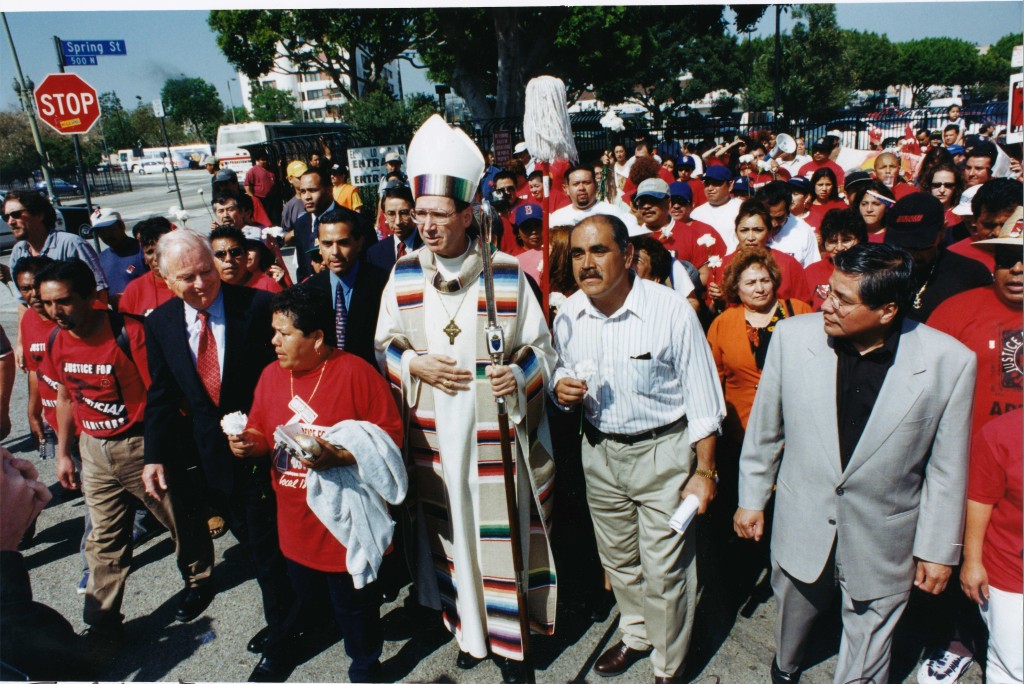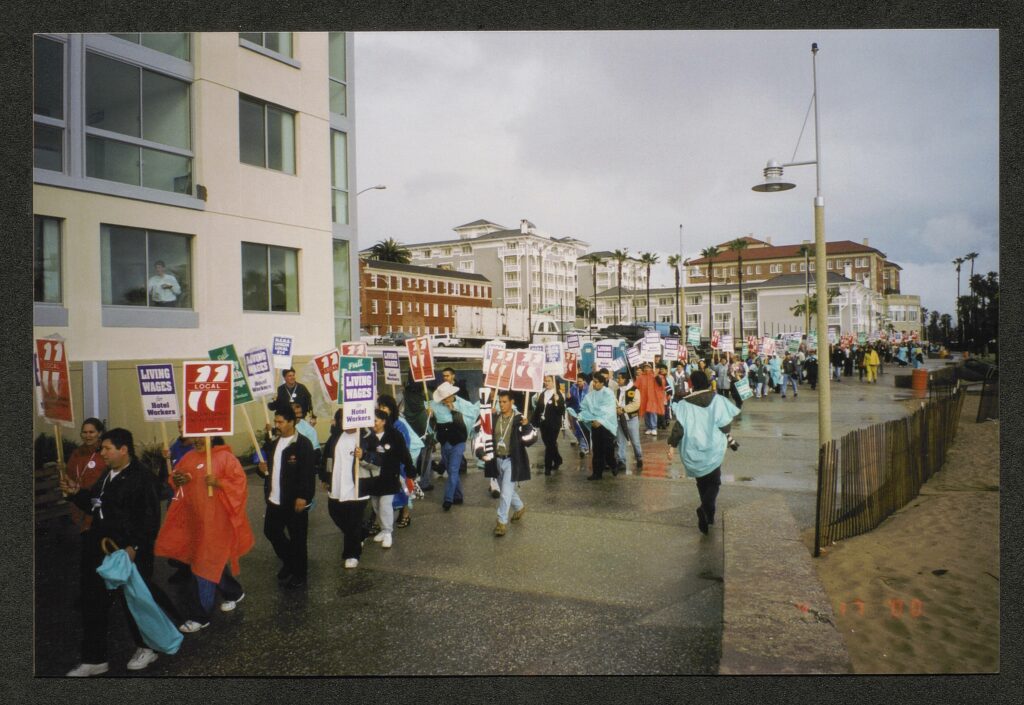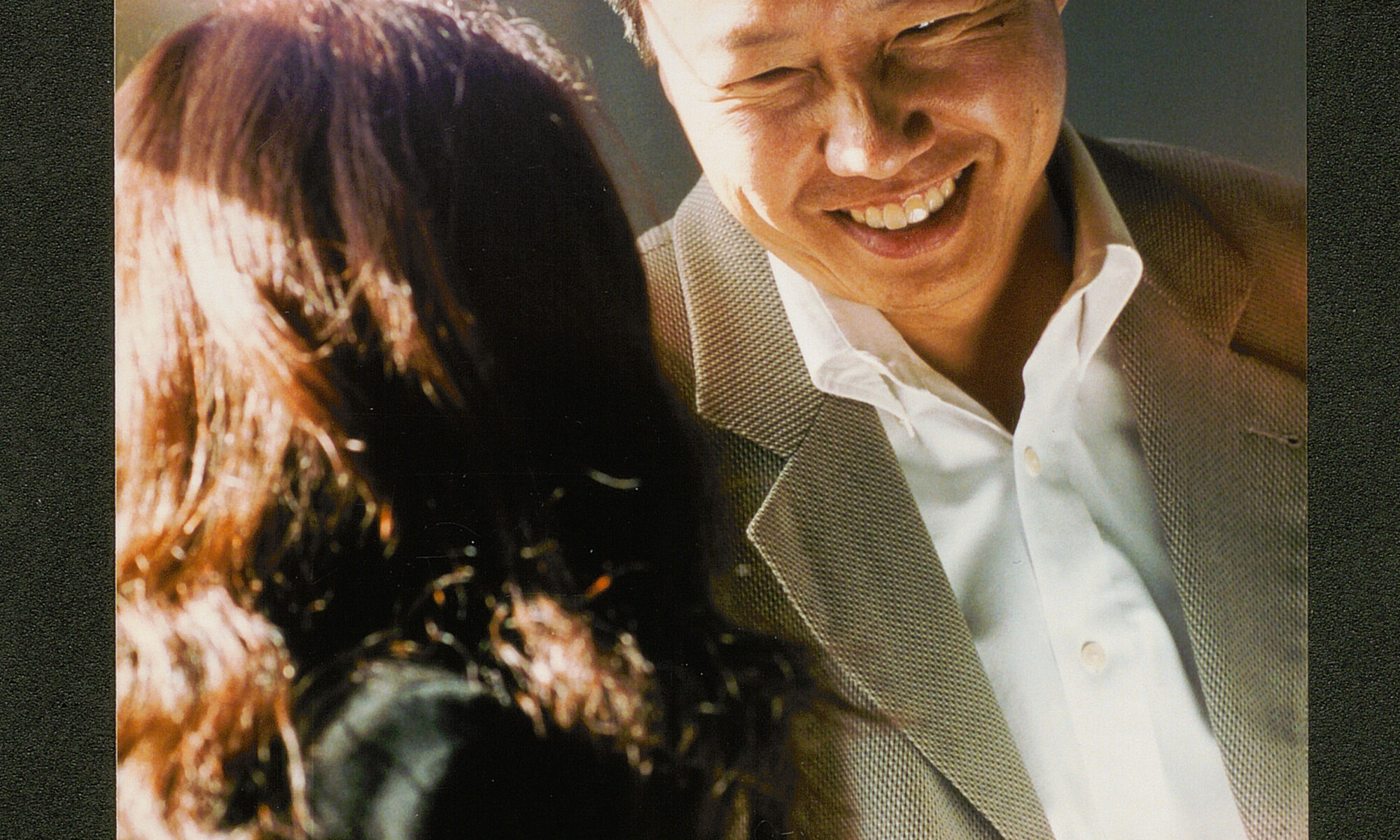In 2004, voters in the city of Inglewood rejected a ballot initiative that would have allowed retail giant WalMart to bypass the opposition of the city council to their big-box store. This documentary, narrated by a local minister, describes the unprecedented labor-community coalition that defeated the world’s largest corporation.
“Our major responsibility and task”: Kent Wong and the 2000 DNC in Los Angeles
The IRLE and labor communities in Los Angeles are mourning the loss of Kent Wong, an outspoken champion of worker rights and labor education. Kent was a tenacious advocate for the most vulnerable, a creative strategist, and an inspiring teacher and mentor to so many. You can read the IRLE’s full statement on his passing here. To honor Kent’s many contributions to the workers justice movement, we will be featuring moments from his life over the coming months, beginning with this interview at the 2000 Democratic National Convention.
In August 2000, the Democratic National Committee held their convention at the Staples Center in downtown Los Angeles. The convention came amidst grassroots insurgency and popular discontent with the Clinton-era model of neoliberal governance at home and abroad. In November 1999, labor unions, environmentalists, faith leaders, and students mobilized in Seattle at the World Trade Organization meeting to protest the new global regime of “free trade” that the Clinton administration helped to enact. Their often confrontational tactics were met by a ferocious law enforcement response that culminated in the Governor of Washington sending in the National Guard to impose a “no protest zone.” The so-called Battle of Seattle inspired similar anti-globalization demonstrations against the World Bank and the International Monetary Fund in Prague and Washington D.C. in the months that followed.
Tensions were also high in Los Angeles in the summer of 2000. Just a few months earlier, the Los Angeles Police Department (LAPD) made headlines with a major corruption scandal centered at its Rampart Division, where officers were revealed to have been involved in shootings, bank robberies, and drug thefts. In early June, the Justice for Janitors campaign of SEIU had waged a successful two-week strike that featured dramatic street demonstrations, at one point threatening to picket outside the NBA Championship at Staples Center. In preparation for the arrival of Democratic Party delegates, the LAPD announced it would be increasing surveillance and enforcement downtown, including establishing a special fenced-in “Media Zone” for the press and “free speech zone” for protesters in a parking lot across from the Staples Center.
The spirit of anger, rebellion, and defiance at the convention – engendered by both the LAPD and the Democratic Party – found an outlet on the first night of the convention when, as President Bill Clinton addressed the convention inside, Rage Against the Machine performed in the “free speech zone.” It also took another form: an independent media group, along with left-leaning journalists and activists, organized a so-called Shadow Convention at the nearby Patriotic Hall. Among them was Kent Wong, the director of the UCLA Labor Center, who was interviewed there by a student activist about his perspective on the DNC and the labor movement. An un-edited video of the interview appears in the IRLE video collection, however the sound quality of the ten-minute video is poor, making it difficult to hear the questions being asked by the reporter as well as Wong’s responses. For that reason, we’ve offered a slightly-edited transcript of the interview below. As we hope you’ll see, Kent speaks with the same vision and clarity that guided his career as an educator, scholar, and organizer.
Kent Wong, interviewed at the “Shadow Convention” during the DNC, August 2000. Wong was asked to begin by introducing himself:
“I’m Kent Wong, I’m the Director of the UCLA Labor Center. We’re very excited to be here as part of the shadow convention and to see all the incredible energy here in the streets of Los Angeles around the Democratic National Convention. I think that this is a very historic time for our movement for social and economic justice, and I see potential for tremendous convergence between labor unions, human rights activists, environmentalists, community-based organizations that has not happened in a long, long time. So, I think that this is really where the future and the hope lies. There’s a lot of debate with regard to the November elections and who we should be supporting, what type of work we should be doing. I really think that the crucial thing for us in this period of time is to strengthen grassroots organizing, grassroots mobilization, and base building. What we’ve seen here in Los Angeles in the last few years is a dramatic resurgence in the Los Angeles labor movement. Immigrant workers are doing unprecedented work in building unions in workforces that have not been unionized in decades and there is this new energy and hope and spirit that, as a consequence, they are bringing into the labor movement. There have been 90,000 new workers brought into the Los Angeles labor movement last year alone. And there is more opportunity—we’ve seen that in the streets of Seattle with the WTO demonstration, in Washington D.C. against the World Bank and the IMF, and right here in Los Angeles and in Philadelphia – the outrage about the corporatization of the political process, about the global domination of capital, and how increasingly working people’s interests and communities of color, poor people are not being heard in this midst of this election.”
He was then asked to comment on the relationship between anti-globalization activism and the labor movement and the impacts of “free trade” in Los Angeles:
“There is unevenness within the American labor movement and there are certain unions that are really at the forefront of building strong organizing campaigns and bringing women, immigrants, people of color into the ranks of the American labor movement. And here in Los Angeles, the Service Employees International Union, the Hotel Employees and Restaurant Employees union, are among the leaders of this movement to organize the unorganized, to bring more diverse people into the labor movement. The reality is that, in terms of the pressures of global capital, it’s the manufacturing unions that are really hurting. They’ve experienced tremendous capital flight, plant shutdowns, the numbers in the manufacturing unions have shrunken substantially in the last few decades. And yet, here in Los Angeles, we have the largest concentration of manufacturing workers in the country. There are close to 700,000 manufacturing workers and the majority are low wage, people of color, immigrants. The largest concentration is the 120,000 garment workers, mainly immigrant women, and the vast majority of those workers don’t even make minimum wage. So [these are] the conditions that we face here in Los Angeles. What I think has emerged very clearly in the midst of some of the exciting organizing that is going on, is that unions realize that they can’t take this challenge on alone and that it’s going to be crucial for battles now and battle in the future to forge very strong partnerships between labor, community allies, the church, environmentalists, human rights, women’s rights groups. And that is the type of convergence that I think we’re seeing here in Los Angeles, in Seattle and in Washington D.C.”
Wong was then asked about the specific impacts of “free trade” on the garment industry and whether existing labor law can truly protect garment workers:
“We really need to explore new forms of organization. The reality is that the vast majority of garment workers are not in unions, but the vast majority of garment workers if given the option, if given the right to join unions, they would do so. If given the right to have a contract, have a living wage, have healthcare benefits, have on the job protections, they would do so. When UNITE, the garment workers union, has tried to organize workers in the garment industry, they have been met with fierce opposition, brutal suppression where, when they successfully organize a Guess [Guess? Jeans] plant, Guess shuts down the factory [and] moves to Mexico. And this sends a chilling message within the garment industry that even if you dare to take the risk and stand forward and to organize, you are confronted with that type of repression. That you’ll lose your job, you’ll be…you know, the factory will shut down. So that is the message that major corporations are sending. We need to explore new forms of organization and that can only happen through a comprehensive dialog between unions, community allies, the religious community, and so forth. And we need to find new ways of bringing workers who very much need the protections of unions into the labor movement.”
Finally, Kent is asked to comment on the DNC and the candidacy of Al Gore:
“The American labor movement came out with an early endorsement of Al Gore that took place in the October 1999 AFL-CIO national convention that was held right here in Los Angeles. That was a pragmatic decision. The decision of the American labor movement was that between Al Gore and George Bush, that Al Gore would provide a much better chance for unions in this period ahead. That he would allow some level of breathing space, that he would allow some level of support for some of the initiatives that labor is engaged in. I don’t think there’s any illusions that Gore represents the hopes and aspirations of working people. Income disparity has grown in eight years of the Clinton-Gore administration. The ranks of the poor has grown, the number of people without healthcare insurance has grown under the Clinton and Gore administration. And yet if you look at the alternative of George Bush, you see a very frightening prospect indeed, with his stance on abortion, on worker rights, on human rights. It’s a deplorable track record with regard to what George Bush represents. So, in building political power, we are going to have to develop a much stronger national movement for social and economic justice to push the national leadership. And what we see in the course of political mobilization, is that more working families and working people are getting mobilized in the course of political action. And you see changes going on in the demographics, you see changes going on in city councils and in the state house. And you see, in the state of California that, yes it’s true that Gray Davis doesn’t agree with labor on a lot of issues, but there’s been a major sea change. There is a difference between Pete Wilson and Gray Davis, there is a difference between having a democratically-controlled state legislature and a right-wing republican—you know pro-226, pro-187, anti-worker, anti-immigrant, anti-women’s rights, anti-gay and lesbian issues. So, there’s a difference and I think that we can’t belittle the difference that exists. That does not challenge our major responsibility and task: and that is to build a broad-based movement for social and economic justice that can push for much more fundamental change that we desperately need in this country.”
That stopped everything
Rosa Beltran reflects on the power of rank-and-file union members

La huelga del 2000 fue una victoria— Yo estaba fuera de mi edificio piqueteando 24 horas seguidas, 24 horas deteniendo, durmiendo, pegado a los containers de basura porque como Uniones, si la Unión de los basureros miraba un janitor que estaba piqueteando, se respetaba eso. El UPS [United Parcel Service] si miraba a alguien piqueteando, respetaba eso. El correo, si miraba a alguien, no había movimiento de nada. Ahí se detenía todo; pero si no había nadie, es por eso que le digo yo de qué sirve tener un sindicato con ejecutivos con buenas ideas, si soldados no habemos. Porque los soldados somos los que llevamos a cabo todo, al final del día. Ésa es la representación que nosotros tenemos.
The strike of 2000 was a victory— I was outside my building picketing 24 hours in a row, resting and even sleeping by the dumpsters because the unions, if the sanitation workers saw a janitor who was picketing, they respected that. If UPS saw someone picketing, they respected that. The postal workers, if they saw someone, nothing moved. That stopped everything; but if there had been no one there, that is why I say what good is it having leaders with good ideas, if you don’t have soldiers. Because at the end of the day the soldiers are the ones that carry it all. That is the representation we have.
From the interview of Rosa Beltran by Andrew Gomez.
Una Causa Justa | A Just Cause
This editorial from La Opinion reflects the widespread support for the Justice for Janitors campaign in the Spanish-speaking community of Los Angeles. The writer argues that the janitors' demands are modest, and that their aggressive campaign reflects a broad dissatisfaction with the power structure in LA. Translated from Spanish by Stephanie Dyer.
A Just Cause, La Opinion, April 6, 2000

Janitors, those informal workers who are responsible for the cleaning of the nation’s skyscrapers and buildings, carry out a tough job that is generally nocturnal and poorly compensated. The majority of them are immigrants, some undocumented, with families that depend – often entirely – on their meager income. They perform a humble job that is little known but important. Every morning, when millions of office workers and professionals report to their jobs to start their workday, the janitors have already fulfilled their duty. The offices, the hallways, and the restrooms are ready so that the world of production continues to function flawlessly.
This week, the Los Angeles janitors, who are among the lowest paid in the country but have also woven an effective organization over the years to defend their interests, made the decision to resort to a strike to demand fairer wages. This is an extreme measure, certainly, but so is their situation. Even representatives of the companies they work for recognize that these workers’ wages are outdated in comparison to wage realities in Los Angeles.
As known, this is one of the most expensive areas to live in America. But it is, at the same time, one of the most privileged, especially in these times of rampant prosperity. Corporate profits have climbed to dizzying heights, but the janitors and other workers have to fight with wages that are barely above the minimum, with which one can hardly survive. There is enough wealth in California for those who clean offices to have a decent, basic wage that permits them a dignified life and resources to educate their children. This has been recognized by the county Board of Supervisors and by several local officials who have declared their sympathy for the strikers, whose latest crusade has radiated from downtown Los Angeles to cities such as Burbank, Glendale, Beverly Hills, El Segundo and Woodland Hills.
The janitors’ claim is not limited only to the interests of their labor union. In reality, the red and black banners that call for justice and have begun to rise proudly as of Monday, speak equally for other sectors that also work hard and that, like the janitors, still await the success that is boasted about so much to arrive where they are.
Translation by Stephanie Dyar
Original text: http://proquest.umi.com/pqdweb?did=493361091&Fmt=3&clientId=1564&RQT=309&VName=PQD
Santa Monica Living Wage – Journey for Justice

In 1999, hospitality workers and their allies formed a new coalition to expand Los Angeles’ living wage ordinance to neighboring Santa Monica. Calling themselves SMART (Santa Monicans Allied for Responsible Tourism), they advanced a proposal to increase the minimum wage for the estimated 3,000 housekeepers, valet drivers, restaurant workers, and security guards who worked in the beachfront hotel district to $10.69 an hour and to require their employers to provide health insurance. As the City of Santa Monica began studying the feasibility of the proposal, opponents of the proposal led by the Santa Monica Chamber of Commerce began gathering signatures to place an alternative measure on the ballot in November which, while raising wages for some government contract workers, would have blocked efforts to increase the minimum wage for workers at private businesses, including those beachfront luxury hotels. They began circulating petitions and sent thousands of mailers to area residents alleging that their proposal (which came to be known as Proposition KK) would better protect workers and consumers in Santa Monica. SMART quickly mobilized in opposition to Proposition KK, “The Fake Living Wage,” holding a series of public demonstrations with religious leaders from CLUE (Clergy and Laity United for Economic Justice) to make it clear to local voters that despite claims to the contrary, Prop. KK would not provide a true “living wage” to Santa Monica workers. Their efforts were successful—more than 78% of Santa Monica voters rejected Prop. KK — but the fight to win a living wage for workers in Santa Monica continued for years.
Pictured here is one of those demonstrations, the “Journey Towards Justice” march on April 17, 2000, in which thousands of hotel workers and their supporters marched in the rain down the Santa Monica boardwalk to St. Anne’s Church, where Father Mike Gutierrez offered blessings to the workers in their efforts to win living wages for all.
Additional images of the Santa Monica Living Wage campaign available at the Los Angeles Alliance for a New Economy (LAANE) records, UCLA Digital Library:
https://digital.library.ucla.edu/catalog/ark:/21198/z16b3b1x
https://digital.library.ucla.edu/catalog/ark:/21198/z1gn4frj
View more photos from the Living Wage Campaign: https://www.flickr.com/photos/uclairle/albums/72177720320809410/

